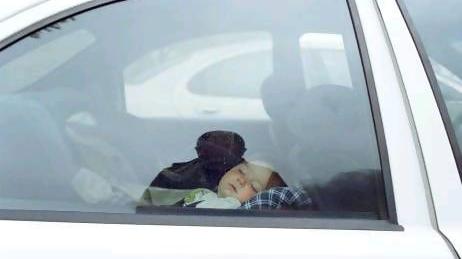When a Child Dies in a Hot Car, Is It an Accident, or Is It a Crime?
孩子悶死車內(nèi),是意外還是犯罪?
By Sharon Otterman
文/莎倫·沃特曼
A father in upstate New York dropped off his two older children at school in 2014,
2014年,紐約北部一位父親將兩個稍大的孩子送到學(xué)校,
and then parked his car outside his house and went to work.
之后將車停在家門口便干活去了。
He forgot that his 15-month old daughter was still in her car seat, and she died of heatstroke.
忘了他15個月大的女兒還在車?yán)铮∨罕阋蛑惺铍x開了人世。
Two years later, a similar death occurred in another upstate town
兩年后,類似的悲劇在紐約北部的另一個城鎮(zhèn)重演——
when a baby boy sweltered to death in his car seat while his father, a police officer, did chores.
一名小男孩兒同樣因為過熱死在了他的座椅里,當(dāng)時,他的父親,一名警察,正在做家務(wù)。
Then last week, a social worker from Rockland County, a suburb northwest of New York City, delivered his 4-year-old to daycare
上周,紐約市西北部郊區(qū)羅克蘭郡的一名社會工作者將他四歲的孩子送到托兒所后
and then he went to work at a Bronx hospital, leaving his year-old twins to die in his car in the heat.
去了布朗克斯的一家醫(yī)院上班,被遺忘在車內(nèi)的一歲雙胞胎也在酷暑中失去了生命。
Though the tragic incidents were jarringly similar, the decisions by prosecutors who handled each of the cases were not.
這些悲劇驚人地相似,處理每一起案件的檢察官的決定卻各不相同。
Prosecutors charged the social worker with manslaughter in the deaths of his twins,
失去了雙胞胎的那名社會工作者被判了過失殺人罪,
while the other two fathers upstate never faced charges.
北部的其他兩名父親卻自始至終都沒有受到任何指控。
The wide variation in charges highlight the complex and fraught nature of the decisions confronting prosecutors — in New York and nationally —
指控的巨大差異也凸顯了檢察官們——不止紐約,全國的檢察官都是如此——需要面臨何等復(fù)雜及令人頭痛的抉擇:
who must decide whether to indict grieving parents who said they simply had forgotten that they had left a young child in a hot car,
要不要起訴那些悲痛欲絕,口口聲聲說著自己只是忘了把年幼的孩子留在了溫度很高的車內(nèi)的父母,
a nightmarish phenomenon that claims about three dozen lives a year across the country.
這一噩夢般的現(xiàn)象每年都會奪走全國30多條性命。
Those decisions are influenced by many factors:
然而,左右檢察官們決定的因素很多:
first, a desire among some prosecutors to extend mercy to parents they believe made a tragic mistake,
其一,部分檢察官希望對他們認(rèn)為犯下了悲劇性錯誤的父母施以憐憫;
next, scientific questions about faulty memory
其二,有關(guān)記憶出現(xiàn)的差錯的科學(xué)問題,
and legal considerations about whether the state can prove the parent is guilty of a crime.
其三,對政府能否證明父母有罪的法律考慮。

Decisions are often made in the face of inflamed public opinion on both sides of the debate.
檢察官們往往要在辯論兩方面的公眾觀點都很激烈的情況下做出抉擇。
As a result, some parents who forget their children in cars face no charges,
所以才會出現(xiàn)部分把孩子忘在車?yán)锏母改笡]有受到任何指控,
others are charged with felonies like involuntary manslaughter
其他人則被控過失殺人等重罪,
and still others are charged with misdemeanors, like child endangerment.
還有一些人被控危害兒童等輕罪這樣彼此不一的結(jié)果。
“All in all, there is no rhyme or reason to how these cases are treated,”
“總而言之,這些案件的處理方式都是沒有道理和規(guī)律可循的,”
said Amber Rollins, the director of KidsandCars.org,
KidsandCars.org的負(fù)責(zé)人安布爾·羅林斯說道,
which is an organization that has analyzed 833 pediatric deaths caused by heatstroke in hot cars since the mid-1990s.
該組織分析發(fā)現(xiàn),自上世紀(jì)90年代中期以來,已經(jīng)有833名兒童死于車內(nèi)中暑。
In the Bronx case, the social worker, Juan Rodriguez,
布朗克斯的案件中,社會工作者胡安·羅德里格斯
told the police he was convinced he had dropped the twins off safely at their day care
告訴警方他確信自己把大兒子送到托兒所后
after he had dropped his older son off at another child-care provider.
把那對雙胞胎也安全送到了托兒所。
But he had not.
然而事實并非如此。
While the babies slept, he drove his usual route to the Bronx,
孩子們睡覺的時候,他按往常的路線開車去了布朗克斯,
parked outside a veterans’ hospital where he worked and put in a full day, from 8 a.m. to 4 p.m., the police said.
把車停在他工作的一家退伍軍人醫(yī)院外面后,就從早上8點一直工作到了下午4點,警方透露。
He had started to drive home before he realized the babies, having died of heatstroke, were still in the back seat.
他開車回家的路上才發(fā)現(xiàn)已經(jīng)中暑身亡的兩個孩子還坐在后座上。
I blanked out,” he told the police. “I killed my babies.”
“當(dāng)時我都懵了,”他告訴警察。“我害死了我自己的孩子。”
譯文由可可原創(chuàng),僅供學(xué)習(xí)交流使用,未經(jīng)許可請勿轉(zhuǎn)載。


